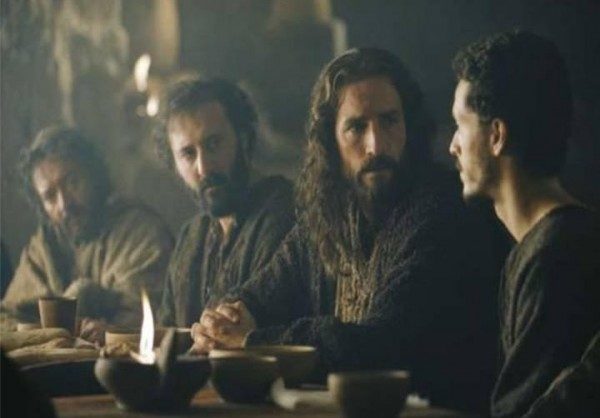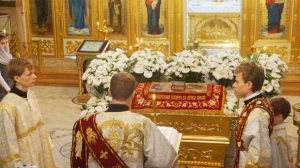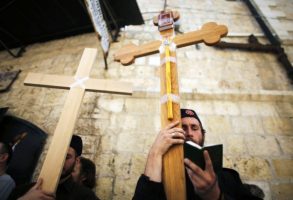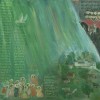The Church has linked the time between Nativity and Pascha into one consequential passage. During this period, Christians are expected to mentally replicate Christ’s journey from Bethlehem to Golgotha. The most important part of this journey is Great Lent.
We have divided the duration of Lent into the weeks of the Publican and the Pharisee, of the Triumph of Orthodoxy, of St. John Climacus, of St. Mary of Egypt, the Holy Week, etc. Yet, Christ and His disciples knew nothing of this thematic timeline. The Lord and His disciples were heading towards Pascha and the crucifixion in a completely different mind frame. Their time had a completely different groove and their souls followed a different trajectory.
We have approached Holy Week. Its meaning and symbolism has been meticulously analysed. However, when analysing the events of these six days, we look at them from the point of view of an observer separated from the event by two thousand years.
However, we can try to shift the observer’s point of view back in time and mentally try to enter the congregation of the disciples of Christ. Then we may be able to ignore our own perceptions of the events of those days and try to listen to the voices sounding in the Upper Room of Sion, in the streets of Jerusalem, on the Mount of Olives, and in the garden of Gethsemane. This immersion will be more precise in communicating to us the atmosphere of the approaching culmination of the mission of Christ.
To achieve this, let us retain nothing but the words that Christ addressed to His disciples discarding all other conversations that were heard this week. And among these words let us choose the imperative form of verbs. Let us also mark the words the Lord uses to draw attention to the Heavens and to the religious corporation, which we will conditionally refer to as “the church.”
And so.
Sunday
Christ comes to Jerusalem and announces His mission. God the Father hears Him and answers Him in thunder.
He walks into the temple and chases away those who bought and sold there saying, “My house shall be called a house of prayer, but you have made it a ‘den of thieves.’”
He tells the disciples not to fear the coming King, for He is gentle, reassuring them, “While you have the light, believe in the light, that you may become sons of light.”
Monday
Christ likens God’s world to a vineyard, and the Heavenly Father to its master.
He draws an analogy between the “church” and the withered fig tree. Denounces the priests:
“The scribes and the Pharisees sit in Moses’ seat. Therefore, whatever they tell you to observe, that observe and do, but do not do according to their works; for they say, and do not do. For they bind heavy burdens, hard to bear, and lay them on men’s shoulders; but they themselves will not move them with one of their fingers. But all their works they do to be seen by men. They make their phylacteries broad and enlarge the borders of their garments. They love the best places at feasts, the best seats in the synagogues, greetings in the marketplaces, and to be called by men, ‘Rabbi, Rabbi.’
But woe to you, scribes and Pharisees, hypocrites! For you shut up the kingdom of heaven against men; for you neither go in yourselves, nor do you allow those who are entering to go in. Woe to you, scribes and Pharisees, hypocrites! For you devour widows’ houses, and for a pretence make long prayers. Therefore you will receive greater condemnation.
Woe to you, scribes and Pharisees, hypocrites! For you travel land and sea to win one proselyte, and when he is won, you make him twice as much a son of hell as yourselves. “
He then addresses the disciples, saying:
“If anyone serves Me, let him follow Me; and where I am, there My servant will be also. If anyone serves Me, him My Father will honour (!!!).”
And He reveals to them the amazing mystery of our future life, in which we will be like the angels:
“ For in the resurrection they neither marry nor are given in marriage, but are like angels of God in heaven.”
Tuesday
He speaks of His kinship with God: “When the Son of Man comes in His glory, and all the holy angels with Him, then He will sit on the throne of His glory.”
On this day, the high priests decide to kill Christ. The Lord warns those who serve Him not to become like the “foolish virgins.” He warns them to make use of their talents assiduously by working only for God, like those who multiplied the talents of their Lord.
He reminds His disciples that serving God means, first and foremost, serving Christ through His people,
“Assuredly, I say to you, inasmuch as you did it to one of the least of these My brethren, you did it to Me.”
Wednesday
He accepts the sacrifice of myrrh from a woman and inspires the disciples with the words, “Assuredly, I say to you, wherever this gospel is preached in the whole world, what this woman has done will also be told as a memorial to her.”
Thursday
We become witnesses to Christ’s conversation with God the Father, which reveals the mysteries of God’s plan,
“Father, the hour has come. Glorify Your Son, that Your Son also may glorify You, as You have given Him authority over all flesh, that He should give eternal life to as many as You have given Him. And this is eternal life, that they may know You, the only true God, and Jesus Christ whom You have sent. I have glorified You on the earth. I have finished the work which You have given Me to do. And now, O Father, glorify Me together with Yourself, with the glory which I had with You before the world was. I have manifested Your name to the men whom You have given Me out of the world. They were Yours, You gave them to Me, and they have kept Your word.
I pray for them. I do not pray for the world but for those whom You have given Me, for they are Yours.
Keep through Your name those whom You have given Me, that they may be one as We are.
Father, I desire that they also whom You gave Me may be with Me where I am, that they may behold My glory which You have given Me; for You loved Me before the foundation of the world.”
He drops a hint about the new heavenly church, “In My Father’s house are many mansions; if it were not so, I would have told you, I go to prepare a place for you.”
This is the day when He gives the special teaching to His beloved disciples in the shadow of the Upper Room of Sion,
“As the Father loved Me, I also have loved you; abide in My love.”
“A new commandment I give to you, that you love one another; as I have loved you, that you also love one another. By this all will know that you are My disciples, if you have love for one another.”
Most assuredly, I say to you, he who believes in Me, the works that I do he will do also; and greater works than these he will do, because I go to My Father.
You did not choose Me, but I chose you and appointed you that you should go and bear fruit, and that your fruit should remain, that whatever you ask the Father in My name He may give you.”
You are My friends if you do whatever I command you. No longer do I call you servants, for a servant does not know what his master is doing; but I have called you friends, for all things that I heard from My Father I have made known to you.
These things I have spoken to you, that My joy may remain in you, and that your joy may be full.”
And as they were eating, Jesus took bread, blessed and broke it, and gave it to the disciples and said, “Take, eat; this is My body.”
Then He took the cup, and gave thanks, and gave it to them, saying, “Drink from it, all of you. For this is My blood of the new covenant, which is shed for many for the remission of sins.”
“He who dipped His hand with Me in the dish will betray Me. “
Friday
On the early hours of Friday, the Lord commanded Peter to put his sword back in the sheath.
On the very day of the crucifixion, Christ had only one word to say and it was addressed to his disciple. Christ said the Theotokos would become the disciple’s mother and he – her son.
All these words seem familiar. However, when strung into a logical sequence, they become so powerful they burn. To those who consider themselves true Christians a lot of it may seem lost, distorted, and the events themselves – repetitive. And because of the obvious analogy, some might feel that the words themselves are “insolent” and “indecent.” They force us to examine what actually makes us different from the inhabitants of ancient Jerusalem.
And so, we see that the Word of Christ to His disciples starts with the promise of the Kingdom of a gentle King and God. Through the labour of a hireling to the labour of love. From slavery to friendship with God. From fearing God to love and to the joy of being with Him.
Today we are the disciples of Christ. We must relate His words to ourselves and absorb them during Holy Week. Just as His disciples, we must concentrate on not only hearing His words, but comprehending them and receiving them as an encouragement to act.
Those who serve Christ as clergymen should ask themselves whether in their own service there is anything approaching hypocrisy, benefit, gain, self-interest, arrogance, disdain, a love of meetings and glory, and most important, the neglect of God and of His main commandment to love. Have we forgotten the fact that the one greater in the Kingdom of Heaven must be least among men, must serve men the way Christ did, as a bondservant.
Those who are in charge of a congregation must examine their hearts to see if there is God’s joy in it, and the love for their neighbour, expressed through sacrifice.
Judas betrayed Christ, having taken the broken bread. Do we not betray Christ by taking more than His body, the whole of communion?
Have we forgotten that our real abode is the Kingdom of Heaven and that Christ Himself has prepared our own personal mansion.
Fortunately, the services of this week are long and there are opportunities for us to come to our senses through prayer and to hear the voice of God within us.
Unfortunately, the services of this week are long and the great multitude of images, thoughts, and feelings ensconced in the texts due to the magnitude of material goes right above our heads.
Yet, we must not lose track of the guiding thread, of the words, with which Christ addresses us. There are not that many of them. We can easily become familiar with them in ten minutes. Ten minutes in five days is not that much.
According to custom, before parting we usually sit down together for a short time and discuss nothing but the main things. Similarly, when parting from His disciples, Christ gave them His entire teachings, the cornerstone of which is the love of God and of people, in concentrated form.
During the last days of Lent, we must make sure we have fasted properly. That is, not in the sense of bringing God a small gift of six pots of lenten porridge and tea without milk. But in the sense of acquiring deeds of mercy, which is the only thing that can justify us on Judgement Day. The only deeds that God needs from us.
It is not hard to see that the last week of Lent reminds us of the whole history of mankind.
The Lord’s coming to Jerusalem reminds us of the creation of the world and of the possibility of living with God.
Christ’s chasing away the sellers from the temple reminds us of the expulsion from the Garden of Eden.
Here, a new Cain, Caiaphas, is planning the murder of the new Abel, Christ.
Here, the brazen murder takes place before God.
Here, the silence of the stunned world of Great Saturday.
But the finale is unusual. As if on the eighth day of creation the Lord leaves His rest and recreates the world so that the very nature of man changes and he becomes more like God through communion. Neither the angels, nor Adam received the Body and Blood of God.
As we near the end of Lent, we should ask ourselves, who are we in this renewed world? What was the point of our fasting and has it brought us just a touch closer to the Heavens? And if it hasn’t, then what follows is the question, what is the point of my life and what does God want with me if neither fasting, nor prayer, nor the mercy of God can melt the iciness of my heart?
You wouldn’t want to hear the words Christ spoke to his sleeping disciples, “What! Could you not watch with Me one hour?” and “This people have blinded their eyes and hardened their hearts.”
But you cannot come too late for God. A whole week is so much. A whole week with God may be more precious than a whole eternity without Him. It makes sense in its duration to hear and accept the most important of all the words Christ spoke,
“That they all may be one, as You, Father, are in Me, and I in You; that they also may be one in Us.”
Translated from the Russian by Maria Nekipelov


















